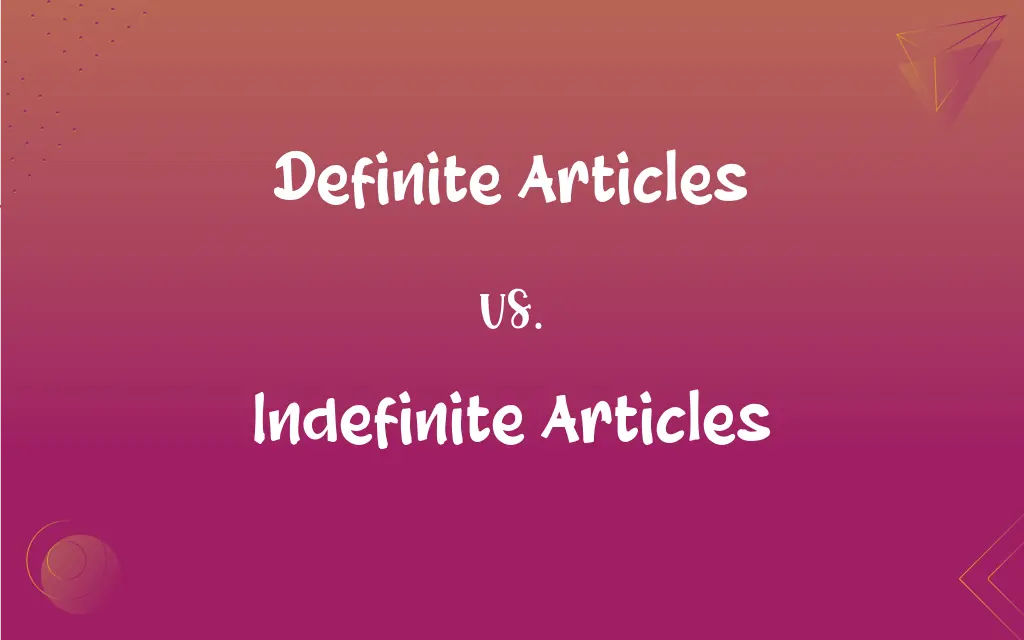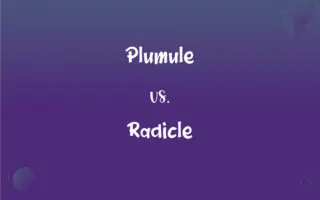Definite Articles vs. Indefinite Articles: What's the Difference?
Edited by Aimie Carlson || By Harlon Moss || Updated on October 30, 2023
Definite articles specify particular items ("the"), while indefinite articles introduce non-specific items ("a" or "an").

Key Differences
Definite articles and indefinite articles are crucial components in English grammar, offering different functions when providing context to nouns. The definite articles, which comprise the singular word "the," are used to refer to specific items or entities. On the contrary, the indefinite articles, "a" and "an," introduce non-specific or general items, indicating that the noun isn't being singled out specifically.
When one examines the application of definite articles, they will notice it precedes nouns that are unique or already known to the listener or reader. Thus, definite articles highlight a particular element. On the other hand, indefinite articles set the stage for introducing something new or not previously mentioned. They keep things in the realm of generalities, indicating any member of a group, rather than a specific one.
For example, using a definite article, one might say, "Pass me the book," implying a particular book in mind. When employing an indefinite article, the phrase might be, "I want to read a book," suggesting any book without specificity. It's evident that the choice between definite articles and indefinite articles can significantly affect the meaning and context of a sentence.
Definite articles are consistent in form, with "the" being the only option, regardless of the noun's starting sound. In contrast, indefinite articles differ based on the phonetic opening of the succeeding noun. "A" precedes nouns beginning with consonant sounds, while "an" is placed before nouns starting with vowel sounds. Thus, while definite articles offer specificity, indefinite articles add variety based on pronunciation.
Comparison Chart
Specificity
Specific
Non-specific
ADVERTISEMENT
Examples
The
A, an
Usage Context
Known items
New or general items
Form Variation
No variation
Varies based on noun's sound
Introducing Items
Particular item
Any item from a group
Definite Articles and Indefinite Articles Definitions
Definite Articles
The singular term used to denote specificity in nouns.
The cat on the roof is mine.
ADVERTISEMENT
Indefinite Articles
The initial mention of a noun in a discourse, often signaling its introduction.
She has a solution to the problem.
Definite Articles
The only article that doesn't change form based on the succeeding noun's sound.
The apple and the clock are on the table.
Indefinite Articles
Grammatical tools with forms based on the starting sound of the subsequent noun.
I saw an eagle and a bear during the trip.
Definite Articles
A word preceding specific nouns to indicate particular items.
I saw the movie you recommended.
Indefinite Articles
Articles suggesting generality rather than particularity.
I need a pen to write a letter.
Definite Articles
An article used to refer to a known entity in English.
The sun is shining brightly today.
Indefinite Articles
Words used before nouns to indicate something not previously specified.
An owl hooted in the night.
Definite Articles
A grammatical tool to signal a noun that is already familiar to the audience.
The lessons learned were invaluable.
Indefinite Articles
Articles introducing non-specific nouns, suggesting any member of a group.
I'd like to buy a car.
FAQs
When should I use definite articles?
Use definite articles when referring to specific or known items.
How do I choose between "a" and "an" for indefinite articles?
Use "a" before consonant sounds and "an" before vowel sounds.
What are the examples of definite articles?
The primary example of definite articles is "the."
Is it correct to say "She is a best teacher" using indefinite articles?
No, superlatives generally require definite articles, so it should be "She is the best teacher."
Can indefinite articles be used with uncountable nouns?
Generally, no. Uncountable nouns don't take indefinite articles unless specified in a certain context.
When using geographical names, do I always need definite articles?
Not always. While some require it (e.g., "the United States"), others don't (e.g., "Canada").
Which are considered indefinite articles in English?
"A" and "an" are the indefinite articles in English.
Can you use definite articles with abstract nouns?
Yes, you can, e.g., "the love of a mother."
Do all languages have both definite and indefinite articles?
No, the presence and usage of articles vary across languages.
When is it appropriate to drop definite articles in English?
In some contexts like referring to generalities (e.g., "Dogs are friendly") or with some proper nouns.
Do definite articles always indicate something previously mentioned?
Mostly, but there are exceptions. For instance, "the moon" can be used generally without prior mention.
Are definite articles unique to English?
No, many languages have definite articles, but their usage might differ.
Why is it "an hour" and not "a hour" for indefinite articles?
"An" is used because "hour" begins with a vowel sound.
Why are there two indefinite articles but only one definite article in English?
Indefinite articles vary based on sound ("a" for consonant sounds and "an" for vowel sounds), while the definite article "the" works universally.
Can using the wrong article (definite or indefinite) change the meaning of a sentence?
Yes, it can change the context and specificity of the noun being referenced.
Do indefinite articles always indicate number?
Yes, indefinite articles always indicate a singular noun.
Can definite articles be used before plural nouns?
Yes, definite articles can be used before both singular and plural nouns.
Why can't I say "a books"?
Indefinite articles are used with singular nouns, so "a books" is grammatically incorrect.
Why is it "an umbrella" but "a unicorn" in terms of indefinite articles?
It's based on sound, not spelling. "Umbrella" starts with a vowel sound, while "unicorn" starts with a consonant sound.
How do definite articles affect the meaning of a sentence?
Definite articles specify particular items, changing the context of the referenced noun.
About Author
Written by
Harlon MossHarlon is a seasoned quality moderator and accomplished content writer for Difference Wiki. An alumnus of the prestigious University of California, he earned his degree in Computer Science. Leveraging his academic background, Harlon brings a meticulous and informed perspective to his work, ensuring content accuracy and excellence.
Edited by
Aimie CarlsonAimie Carlson, holding a master's degree in English literature, is a fervent English language enthusiast. She lends her writing talents to Difference Wiki, a prominent website that specializes in comparisons, offering readers insightful analyses that both captivate and inform.































































